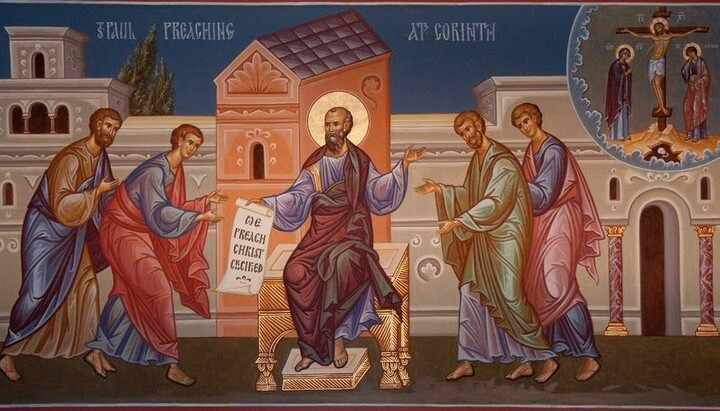Homiletics: The Sacred Responsibility of the Clergy

“Preach the word! Be ready in season and out of season. Convince, rebuke, exhort, with all longsuffering and teaching” (1 Timothy 4:2).
Preach. Κήρυξον.
This imperative of the Apostle Paul to Timothy lays out succinctly the call of the clergy to embrace the homiletical task “in season and out of season.” Paul himself confessed (2 Timothy 1:11) that he shared this high calling as a herald (κήρυξ - preacher), apostle (ἀπόστολος), and teacher (διδάσκαλος). While distinct, these responsibilities comprise a significant aspect of the sacred calling of the apostles and their successors.
In common practice, however, some Orthodox parishes have been labeled “Sacrament Factories” where the richness of the homiletical task is scant at best. While this has long been said of Roman Catholic parishes, the critique is finding its way into our own circles. But is it fair?
If we understand the homily to be a pause in the Divine Liturgy (a short, holy “time out” as it were), prior to what really matters, then maybe not.
If, however, we understand the homily to be the sacred responsibility of the clergy, deeply integrated into the liturgical rhythm of the church and being foundational to the sacramental life, then maybe so.
The latter is easier to spot, but more difficult to find. In these parishes—where preaching is taken seriously—the clergyman is prepared. It is evident to all the hearers that he has prayed his way through the appointed Gospel reading and, concurrently, through the difficult work of preparing the homily. It might well be that these homilies are written out; if not, they are nonetheless delivered with an evident preparation and seriousness. Lives are at stake. More than anything, these homilies emerge from the heart of a priest who cares deeply for his people and wants them to walk the royal path.
Often, because of its place in betwixt and in between the Gospel and the Anaphora, it pulls the hearer from the liturgy of the catechumens to the liturgy of the faithful and prepares them for the reception of the Lamb of God in the Holy Eucharist. These homilies do not compete with the liturgy but are deeply integrated into the liturgy itself as a constitutive element. This is, of course, the homily’s natural home.
The former, sadly, is becoming a phenomenon in Orthodoxy. The homily, if offered at all, feels more like a pause before the Anaphora begins. It is likely that the homily is more moralistic or therapeutic than it is a real, heraldic call to Christ and His divine life. While jokes are not entirely sinful, they often dominate in these homilies, as laughs are the world’s currency when it comes to likeability and social media clicks.
Finally, a sad reality in these parishes is the growing trend to relegate the homily to a layperson, both men and women. The latter reality is more dangerous, as it confuses the faithful and silences the gospel. One can even find numerous homilies from Orthodox “scholars” online—many of whom are women. While they may be oratorically pleasing, they do not constitute preaching. In short, they are not homilies at all, belonging to the classroom or the lecture hall but not the divine liturgy; they do not embody the Lord’s model for preaching, as delineated by the Apostle Paul (this is to say nothing of the imperative that women not teach [διδάσκειν] within the Church [1 Timothy 2:12]), meaning the homiletical burden is not intended to fall to them).
While the quality of homilies by the clergy must be improved (which might well be a focus of later essays), we must begin by remembering what the homily is and to whom it is given. The Lord, in His infinite mercy, has bestowed upon us a multitude of holy gifts. The Holy Church is not a “Sacrament Factory,” instead, it is the only thing that truly is.
The world, with all its brokenness, is not our home. Our home is the Church. And just as we are fed within the Church’s confines, so we are led with a living voice. This viva vox comes to us in the public reading of the Scriptures, of course, but the life contained therein is conveyed to us, communicated as it were, through the words of the clergy, as they take upon themselves the heavy burden of preaching.
Preach. Κήρυξον.
The clergy must do this.
Others must be ready to listen.
And in this divine dialogue between the Giver and the ones given-to, the Lord will show us more robustly how deep and infinite His love is toward us sinners.
About the Author
Fr. Joshua Genig is the Rector of St. Innocent of Irkutsk Russian Orthodox Church in Redford, MI. He is a faculty member of Holy Trinity Orthodox Seminary in Jordanville (ROCOR) and serves as the Dean of the Central States of the Moscow Patriarchate. He is a regular contributor to UOJ-USA, where he primarily writes on homiletics, catechism, and other edifying topics.
Fr. Joshua received his B.A. in Religious Studies from Concordia University, Ann Arbor (2003); his M.Div. in Theology from Concordia Theological Seminary, Fort Wayne (2006); and his Ph.D. in Systematic Theology from The University of St. Andrews, UK (2012).









